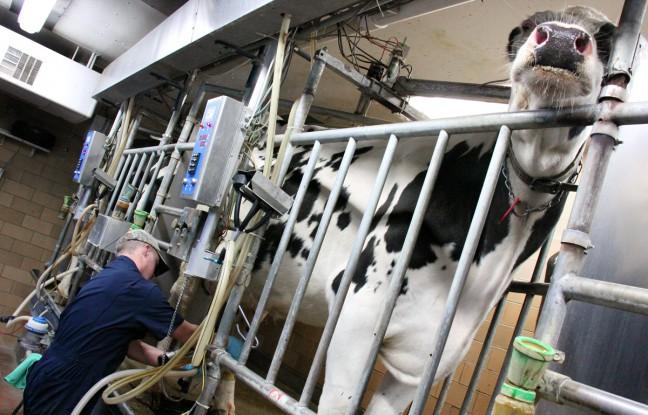Cars and buses rush down University Avenue. Sidewalks and bridges lace the intricate web of buildings in the center of the University of Wisconsin campus. And in the middle of it all lies the Dairy Cattle Center, home to a herd of 84 milking cows.
The Dairy Cattle Center is used for teaching and research in the Department of Animal and Dairy Sciences. The milk produced there is processed by the Department of Food Science with the Dairy Research Center and used to create the campus star — Babcock ice cream.
The Department of Animal and Dairy Science raises dairy cattle to produce the highest-quality milk for our eating pleasure. Despite how delicious it is, the ice cream can cause some students to overlook the complexity behind the production process, according to Heather White, an associate professor in nutritional physiology at UW and the faculty director of the Dairy Innovation Hub.
“I think the part that’s most overlooked is how complex and integrated it is, how many different aspects there are to it,” White said. “So everything, from how we take care of the animal to how much value the farmer is placing on the impact on the environment and the consumer’s perspective of what they produce, all the way to how delicious the ice cream is from Babcock.”
UW female students represent future of STEM despite underrepresentation
UW professor and extension specialist in dairy farm management Victor Cabrera said there should be a greater emphasis on the importance of raising cattle and milk production because it is the first step in the process of creating the dairy products we know and love.
The process of raising the dairy cattle herd is mostly run by undergraduate students in the Department of Animal and Dairy Science. Gaelan Combs, a senior in White’s lab majoring in dairy science, said having cows on campus allows for valuable hands-on experience, especially for people who were not raised on dairy farms.
“It’s important to sit in lecture and learn, it’s a lot more fun and more valuable to learn it hands-on, and so I think that’s a big part of the value of [having dairy centers and research facilities],” White said.
Dairy at UW has a lengthy and prominent history — it’s part of America’s Dairyland, after all. White said the state and the university have continued their legacy through dairy research with programs like the Dairy Innovation Hub, a state-supported research program that funds dairy science research at three Wisconsin universities.
UW chemistry lab discovers potential replacement to carbon based fuel economies
According to its website, the Dairy Innovation Hub is focused on research in four areas — land and water resources, human health and nutrition, animal health and welfare and farm businesses and communities. The Dairy Innovation Hub is unique to our state, according to Maria Woldt, the program manager of the Dairy Innovation Hub.
“There are other states that have allocated lines of funding for dairy research … but none that are really talking about the entire dairy system, so not just the cow but the community, our climate, our water, our air, what we eat,” Woldt said. “So, in that sense, there’s a lot of eyes on this initiative from around the country and around the globe.”
In the past, the Dairy Innovation Hub has funded over 100 projects in a variety of disciplines, White said. Among them, one used waste products from milk processing as materials for 3D printing, and another studied ways cheese can be good for the heart.
Due to Wisconsin’s lengthy history of dairy research, White said the research funded by the organization often engages researchers who have never answered dairy-related questions before. The focus of the project is on research that impacts farmers who live in Wisconsin.
Cabrera also works to improve dairy research for Wisconsin farmers as the director of the Dairy Brain project, which is a collaboration between the Department of Animal and Dairy Science and the Department of Computer Science.
The Dairy Brain project collects and analyzes data from Wisconsin farms to help farmers and consultants predict their future performance and make decisions about their farm management systems.
Farms send data about their nutrition, genetics and production systems to the Agricultural Data Hub, where a team of developers is working on creating a web application to integrate and analyze the data.
In the meantime, an extension team meets with farms to review and add value to their current data. Currently, the project is collaborating with five Wisconsin farms, but Cabrera said he expects the project will scale up in the future.


















